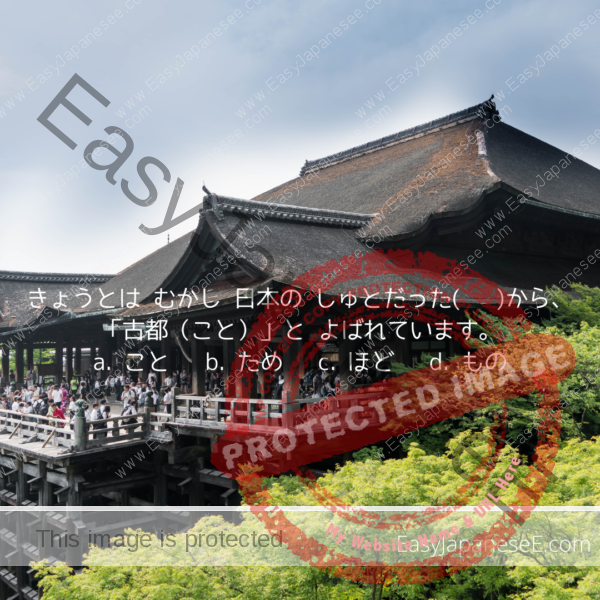
Today’s Question
京都は昔日本の首都だった( )から、「古都」と呼ばれています。
a. こと b. ため c. ほど d. もの
Today’s Grammar Point: ~ことから…
~ことから… is a rather formal expression most often used to explain the origin or the history behind a certain name/nickname.
Connections
- [plain verb] + ことから…
- [いadjective] + ことから…
- [なadjective] な/だった + ことから…
- [noun] である/だった + ことから…
Examples
私の英語の先生は日本人ですが、いつも茶色いスーツをきていることから、「Mr. Brown」と呼ばれています。
My English teacher is Japanese, but because he always wears a brown suit, he is called “Mr. Brown.”仙台には緑が多いことから「杜の都」と呼ばれています。
Because Sendai is full of greenery, it is called “City of Trees.”長崎は夜景がきれいなことから、「夜景の街」と呼ばれることがあります。
Nagasaki is sometimes called “the city of night views” because of its beautiful night view.京都は昔日本の首都だったことから、「古都」と呼ばれています。(Today’s question sentence)
Kyoto used to be the capital of Japan, so it is called the “ancient capital.”
~ことから can also be used to explain the reason behind a general conception, a common judgement or an established fact.
Examples
田中先生は英語の先生ですが、いつも式典でピアノを弾いていることから、音楽の先生だと思っている人が多いです。
Mr. Tanaka is an English teacher but because he always plays the piano at ceremonies, many people think he is a music teacher.この店は本当はうどん屋ですが、ラーメンもおいしいことから、ラーメン屋だと思われています。
This shop is actually a udon shop but because their ramen noodles are also delicious, it’s considered a ramen shop.鈴木さんは文章を書くのが上手なことから、広報の仕事を任されました。
Ms Suzuki is good at writing passages, so she was entrusted with public relations work.このキノコは独特の香りがあることから、マツタケだとわかります。
Because this mushroom has a distinctive smell, we can tell it’s matsutake.
When you can’t use ~ことから
~ことから cannot explain a reason behind something subjective or anything that is not generally established. You cannot use it before a question or a suggestion, either. To simply describe a reason, see these posts: 「~から」 and 「~ので」 and 「~から」 and 「~ので」(Cont’d).
朝寝坊したことから、学校に行きたくない。
⇒朝寝坊したから、学校に行きたくない。
Because I slept in, I don’t want to go to school.
あの店のチーズケーキがおいしいらしいことから、今度一緒に行きませんか。
⇒あの店のチーズケーキがおいしいらしいから、今度一緒に行きませんか。
Apparently cheese cake in that shop is delicious. Why don’t we go there together next time?
Answer to today’s question: a (for meaning see above)
If you liked this article, please share it with your friends using the social media buttons below. Also, your clicks on ads on this page help covering the cost of running this website. Your support will be much appreciated.

